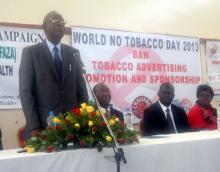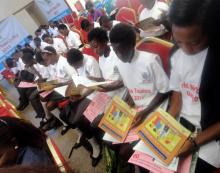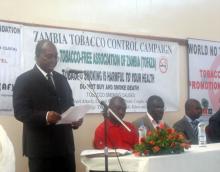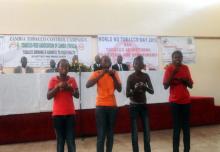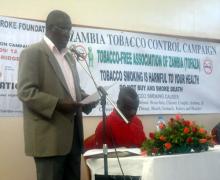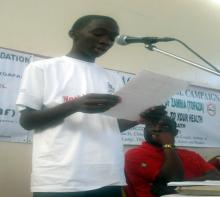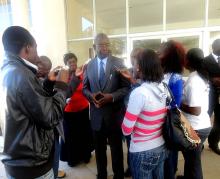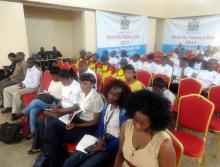Highlights of the World No Tobacco Day 2013 commemoration in Zambia
Zambia joined the rest of the world to commemorate the World No Tobacco Day on 31st May under the theme “Ban tobacco advertising, promotion and sponsorship”. The Ministry of Health took the lead in mobilising various partners and stakeholders to participate in the campaign events. Government Ministries and Departments, Non-Governmental Organizations, Youth Organizations, schools and community based organisations are taking part in the various advocacy and awareness raising events lined up for the WNTD 2013 campaign.
In his statement to mark the launch of the WNTD 2013 campaign in Lusaka, the Hon. Minister of Health Dr. Joseph Kasonde said that the theme for WNTD was appropriate because it called upon countries such as Zambia to hasten and accelerate efforts to advocate for and stimulate action towards the implementation of article 13 of the WHO Framework Convention on Tobacco Control (WHO FCTC) which makes provision for countries to implement comprehensive bans on tobacco advertising, promotion and sponsorship.
Dr. Kasonde said that it was important that Zambia put in place enforceable measures to ban tobacco advertising, promotion and sponsorship and committed his office to prepare a proposal to move the tobacco control agenda forward. He also called upon the Permanent Secretary in the Ministry of Health to constitute a multi-sectoral task force to address the issues surrounding tobacco control in Zambia in line with the obligations contained in the WHO-Framework Convention on Tobacco Control. The Minister stated that tobacco companies spent huge sums of money to market tobacco products where ever youths could easily access such information particularly in movies, internet, fashion magazines, sports, events, music and social media leading many young people into a life-time of addiction.
In 2008 the Zambian government prohibited smoking in public places through statutory instrument no. 39. The Public Health Act Cap 295 and the public health regulations 1992 issued under statutory instrument no, 163 also regulate public smoking. The Ministry of Health has published a manual on the enforcement of smoke-free laws and trained health inspectors both in public and private institutions.
WHO urges member countries to take concrete steps to ban tobacco advertising, promotion and sponsorship
At the same function the WHO Representative, Dr. Olusegun Babaniyi delivered a statement of the WHO Regional Director for the African Region Dr. Luis G. Sambo.
Below are the key issues raised in the statement :
- Tobacco kills up to one half of all users and remains one of the leading preventable causes of death. In fact tobacco kills nearly six million people each year world-wide, and of these more than 600,000 are those exposed to second-hand smoke.
- In the African Region, current tobacco use is about 11.5% for both sexes. Among the youth, 18% currently use tobacco products and the use of tobacco products other than cigarettes is 11.6%. About half of these youths (48.2%) are also exposed to second-hand tobacco smoke in public places.
- A total ban on tobacco advertising, promotion and sponsorship is a powerful tool to combat tobacco use.
- The WHO Framework Convention for Tobacco Control calls for a total ban on all forms of commercial communication, recommendation or action and all forms of contribution to any event, activity or individual with the aim, effect, or likely effect of promoting a tobacco product or tobacco use either directly or indirectly.
- Progress in comprehensively banning tobacco advertising, promotion and sponsorship is slow in the African Region. Five countries have comprehensive bans that cover all forms of direct and indirect advertising. Another 22 countries have bans on national television, radio and the print medium for tobacco advertising only. However, this level of ban is still insufficient to protect people from tobacco advertising and marketing.
- Evidence shows that a total ban on all tobacco advertising, promotion and sponsorship could decrease tobacco consumption by about 7%, independent of other tobacco control interventions.
- Therefore, banning tobacco advertising, promotion and sponsorship is a proven and effective measure to reduce the harmful effects of tobacco in society. - I urge Member States to take concrete steps to ensure that any form of recommendation or action or commercial communication aimed at promoting a tobacco product directly or indirectly is banned. the population on the dangers of tobacco and raise community awareness T
- The general public should reject all forms of tobacco advertising, promotion and sponsorship.
- Civil society has a central role to play to help educate the community about dangers of tobacco use and to advocate for tobacco control laws.
Civil society calls upon government to enact tobacco control legislation in line with the WHO FCTC
The Zambia Consumer Association was actively involved in the WNTD commemoration. The Executive Director, Mr. Muyunda Illilonga called upon the government to accelerate the process for the finalisation of the Tobacco Control Bill of 2010 and the enactment of the tobacco control legis-lation. He stated that the fight against tobacco was a struggle between public health and profits because the Tobacco industry was only interested in profits and did not care about the consequences of tobacco use on the health of the users. Mr Muyunda said that most of the lung cancers which were reported in the country were mainly due to tobacco smoking.
Young people advocate for laws against advertising, promotion and sponsorship
Young people are particularly targeted by the tobacco industry through advertising, promotion and sponsorship. On WNTD, young people called upon the government to enact and enforce laws to curb the actions of the industry. The youth above stated that the Tobacco industry was not an industry, but a disease vector. He asked government to make a choice between protecting public health or to leave the tobacco industry to continue endagering the health of the citizens in an environment without stiff tobacco control laws. Information and education materials targeting young people were printed and distributed during the WNTD function.
_________________________________________________________________
For More information contact :
Nora Mweemba, Health Information and Promotion officer WHO Country Office,
UN ANNEX BUILDING Plot 4609, Corner of Andrew Mwenya and Beit Roads, Rhodes Park
GPN Number 37609, Mobile 097873976, P.O. Box 32346, Lusaka, Zambia.
E-mail: mweemban [at] zm.afro.who.int
Tel No: 00-260-211-255 398 / 255 336 / 255 322 Fax: 00-260-211-252863

